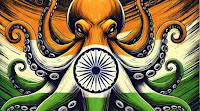In the later years of my life, I completed a PhD thesis
titled “The Rise of Indian Hegemony in South Asia and the Security of Small
States.” This work was finalized in mid-2022, a period marked by the
authoritarian rule of Sheikh Hasina in Bangladesh, who maintained a firm grip
over a population of 180 million. In brief, the conclusions of my research were
as follows:
• As soon as British colonial rule in the subcontinent ended
in 1947, India embarked on a relentless quest to establish complete hegemonic
control over the region.
• Despite being relatively weaker both militarily and
economically, Pakistan emerged as the primary regional barrier to India’s
ambitions. Beyond the region, China also posed a formidable challenge to
India’s hegemonic aspirations.
• Indian hegemony has been thwarted in Sri Lanka, Nepal,
Afghanistan, and the Maldives.
• India has only managed to establish hegemony over Bhutan
and Bangladesh in the region. In the case of Bhutan, this dominance has been
maintained through a treaty signed in 1949, allowing Delhi to exercise absolute
authority to this day. Consequently, Bhutan has been prevented from
establishing official diplomatic relations with any of the five permanent
members of the United Nations Security Council—the United States, China,
Russia, the United Kingdom, and France. In contrast, India’s dominance over
Bangladesh was achieved without any formal hegemonic treaty. Instead, India
installed a brutally oppressive puppet government in 2009.
In the great revolution of August, the courageous students
and citizens of Bangladesh, through unforgettable sacrifices and acts of
heroism, have successfully overthrown the puppet regime installed by India. The
murderous fascist Sheikh Hasina has fled to her master, India, to escape the
public’s wrath. In a cruel twist of history, the very daughters of the fallen
dictator Sheikh Mujib, who had come from Delhi in 1981 to execute India’s
mission in Bangladesh, have now been humiliatingly forced to return to Delhi
after forty-three years. The people of Bangladesh have, at long last, awakened.
However, in the meantime, Hasina, a lackey of Delhi, left behind a trail of
destruction, dismantling every institution of the state.
The judiciary has been so severely compromised that it no
longer retains any semblance of legitimacy in the eyes of the public. Back in
2010, I authored an editorial titled
“A Farce in the Name of Independent Justice,” which resulted
in my prolonged detention and torture by the Detective Branch and Rapid Action
Battalion. The young heroes of today’s revolution may not even be aware of
these incidents.
Due to Sheikh Hasina’s ruthless use of the police as her
personal death squad, this essential state institution has become the object of
extreme public hatred. Sixteen years of disgraceful sycophancy from the media
have left the so-called fourth estate of the state devoid of any credibility.
The civil administration has been debilitated by pervasive
partisanship and corruption, while the nation has been plunged into
insurmountable debt under the guise of fake development.
My sympathy lies with Dr. Yunus’s government, which has
inherited this lamentable legacy. None of the statistics produced by the fallen
government of Bangladesh can be considered credible.
Since 2018, I have repeatedly communicated with the World
Bank, ADB, and IMF, bringing to their attention Sheikh Hasina’s corruption and
the manipulation of statistics. However, my warnings have been consistently
disregarded. Whether the officials in these institutions in Bangladesh were
themselves complicit in Hasina’s corruption remains unknown, but how else could
they have blindly accepted such false statistics year after year? Surely, they
are not all fools.
The critical question now emerges, will India quietly endure
this catastrophe?
The fall and flight of Sheikh Hasina in a bloodless
revolution is not merely a diplomatic setback for Delhi; it represents the most
devastating strategic defeat for India’s hegemonic ambitions in South Asia.
Even the humiliating defeat of the Indian military in Sri
Lanka in 1989 is surpassed by the revolution in Bangladesh. The most remarkable
achievement of the young revolutionaries lies in the fact that they accomplished
this without any external support.
For fifty-three years, we have been paying for the
assistance taken from India during the liberation war of 1971. While every
political faction in the country, whether left or right, alongside the media
and so-called intellectuals, has persistently invoked the memory of 1971, they
have simultaneously exploited us economically and dominated our internal
politics.
This time, no external power can claim any credit. The
United States, despite its rhetoric on democracy and human rights, ultimately
deferred to India’s stance on Bangladesh.
The people of Bangladesh have liberated themselves from the
shackles of fascism through extraordinary courage and sacrifice, as exemplified
by Abu Saeed’s martyrdom. We owe no debt of gratitude to anyone.
Internationally, Dr. Yunus is widely recognized for his
close ties with the United States. However, neither he nor any other civil
society figure played a pivotal role in this revolution.
Notably, I cannot recall any instance where Dr. Yunus has
taken a decisive stance against Indian hegemony in Bangladesh, nor has he
publicly condemned Hasina’s enforced disappearances, extrajudicial killings,
and human rights abuses. What he may have done behind the scenes is unknown to
the public.
Indian Nobel laureate Amartya Sen has always been vocal
against Modi’s Hindutva and misrule. Nevertheless, we want to hope that Dr.
Yunus will now take a stand against Indian hegemony. As the primary beneficiary
of the people’s revolution, he bears a responsibility to repay the debt he owes
to the people of Bangladesh.
Although more than a week has passed since the formation of
the new government, we have yet to hear any statements from those in power
regarding the lopsided agreements with India.
This piece concludes with a call for the formulation of a
strategy, in unison with the people, to free Bangladesh from the clutches of
the Indian octopus. Long live the revolution.
Bangladesh Zindabad.


